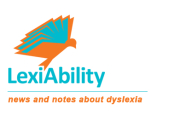Although we are not quite sure how this is going to play out in the field of dyslexia, this position is HUGE: Read the National Institutes of Mental Health’s Statement on “Transforming Diagnosis”
The NIHMH has said, without equivocation, that the weakness of the DSM is “its lack of validity.”
The NIHMH has begun the Research Domain Criteria project, a ten-year endeavor, to “transform diagnosis by incorporating genetics, imaging, cognitive science and other levels of information to lay the foundation for a new classification system.”
In addition the NIHMH asserts, “Indeed, symptom-based diagnosis, once common in other areas of medicine, has been largely replaced in the past half-century as we have understood that symptoms alone rarely indicate the best choice of treatment. Patients with mental disorders deserve better.”
The NIHMH has essentially called out the APA and declared itself on a different playing field. For someone who goes through the diagnostic hoops to get a 315 diagnostic “reading disorder” code, and this is not given, it opens the door to say, “Perhaps the diagnostic system used to assess dyslexia, although reliable (not really), is not valid.”
The assessment of dyslexia needs to change. Although longitudinal, replicated, statistically significant research says that 20 percent of the population has dyslexia, it remains woefully under-diagnosed and often misdiagnosed.
I also believe that pathological ascription of dyslexia needs to change as well… but that’s another post for another day!






Connect with LexiAbility
RSS
Facebook
Twitter